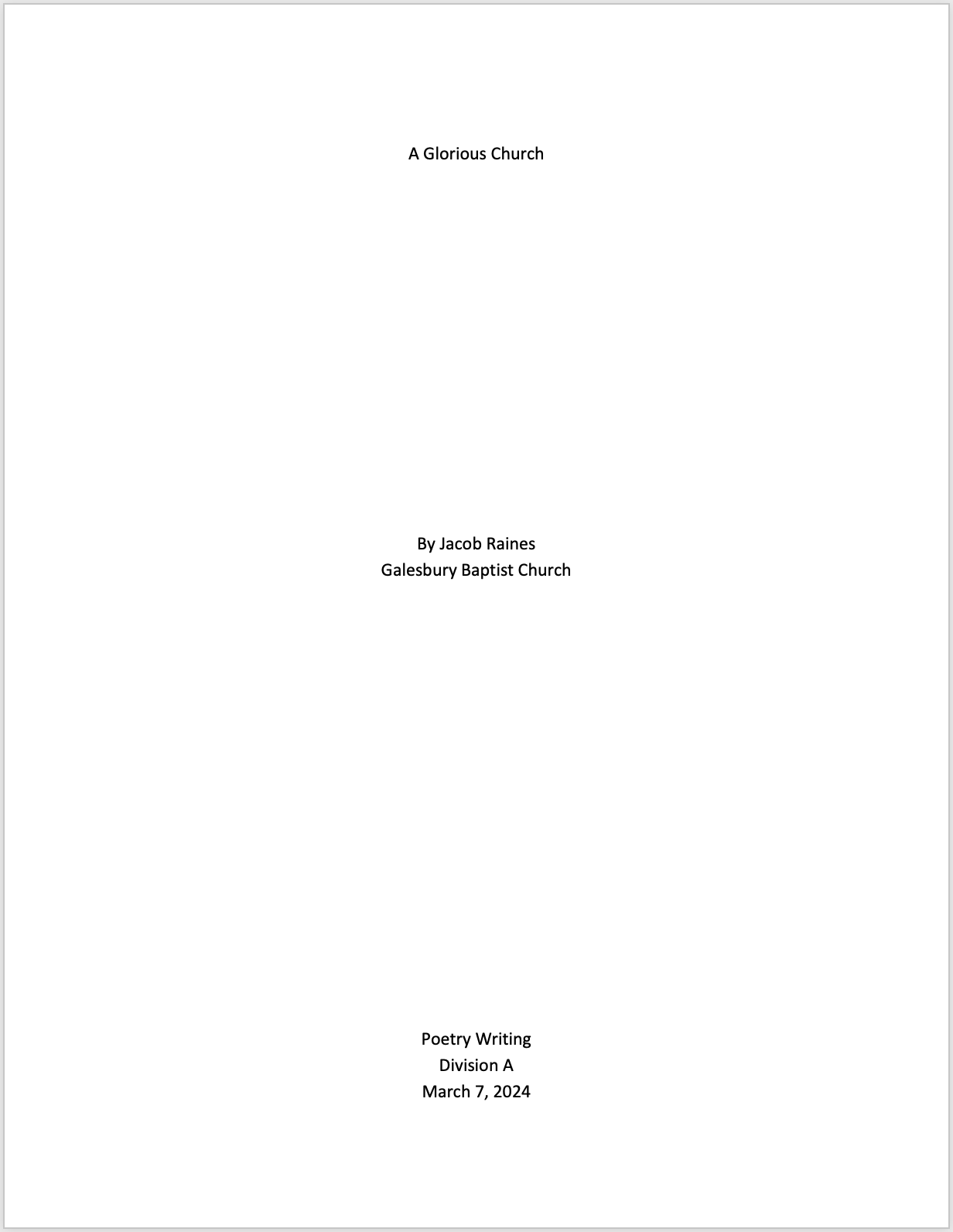Short Story Writing Guidelines
Each church-school is allowed to enter 3 participants, male or female, per Division.
Each student may submit one story only.
Stories must be submitted two (2) weeks before Convention or your entry will not be judged.
Please send a clean scan of the story, the Short Story Writing Judging Form (filled out with student information) as well as the signed Statement of Assistance to dlindhorst@faithway.org.
The participant writes and submits a fiction composition. The story may be based on real experience; it may be purely imaginary; or it may be a fictionalized report of an historical happening. Each story must have a Biblical theme.
The story can be true, imaginary, or fictional but must have an evangelistic, Biblical, Christian growth, or historical theme.
The story must have been written after the end of the previous Student Convention and must be the original work of the student.
Plagiarism of any kind will automatically disqualify the entry. Stories written with the help of AI will not be judged.
A significant portion of the story must be written during school hours to verify authenticity. A statement declaring how much assistance was provided must be submitted with the story.
Follow the rules for the Cover Sheet as shown.
Checklist for Short Story Writing:
Length – 300-500 words for Division “A,” and 600-1,000 words for Division “B.”
Format – should be double-spaced on plain white paper; one full inch margin on all sides. Use 10-12 point type. Recommended fonts: Times New Roman, Helvetica, or Arial. No heavy, bold or fancy fonts.
Each story must be emailed two (2) weeks before the date of Convention as a PDF. Each scan must be clean and clear with the student’s name attached to the Subject Line. Each submission must also have a Judge’s Form filled out and scanned with the story.
Hints from Short Story Judges:
Judges look for stories that are original and imaginative yet believable. It is important that your Short Story contain a balance of all the elements of narrative fiction; plot, setting, characterization, conflict, and resolution. It should not overemphasize one to the detriment of the others. Because of space limitations, it is important that you develop each facet of your story carefully and thoughtfully, paying particular attention to your choice of words. Use words economically, that is, do not use several trite, colourless words when one strong, imaginative word could replace them and enhance the tone of your story. Neither should you waste good words. Make each one count. Consider it carefully. Is it there for a reason? Is it used accurately? Does it tell the reader exactly what you want him to know, or does he have to guess at your meaning? When you are satisfied that your story says what you want it to say, check it carefully to eliminate errors in grammar, punctuation, and spelling. Also, check the word count, since judges will subtract points if you exceed the limits.
SHORT STORY WRITING JUDGING CRITERIA (Download PDF)
| Areas of Evaluation | Possible Points |
|---|---|
| The story | |
| A. Characters consistent, plausible, and motivated | (1-15) |
| B. Details of setting (place / time) woven into the action of the story | (1-10) |
| C. Well-planned plot, with incidents that build to a main conflict | (1-15) |
| D. All incidents build to a climax that resolves the conflict | (1-10) |
| E. Story demonstrates an evangelistic, inspirational, Biblical, Christian growth, patriotic, or historical theme | (1-10) |
| F. Story indicates creativity on the part of the author | (1-15) |
| Mechanics | |
| A. Neatness, general appearance | (1-5) |
| B. Spelling | (1-5) |
| C. Punctuation | (1-5) |
| D. Grammar is correct, tenses are consistent, subjects and verbs agree, and pronouns and antecedents agree | (1-5) |
| Proper documentation submitted | (1-5) |
| TOTAL POINTS | (100) |
Note: as many as 10 points may be subtracted if story does not come within 600 to 1,000 words and is not printed / typed on plain white paper.
Download cover-sheet-sample.docx file
Sample of Cover Sheet for Short Story Writing

